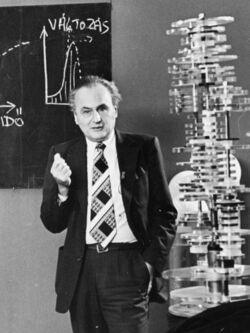Biography:György Marx
György Marx | |
|---|---|
 Marx holding a lecture in 1981 | |
| Born | 25 May 1927 |
| Died | 2 December 2002 (aged 75) Budapest, Hungary |
| Education |
|
| Known for | |
| Awards |
|
| Scientific career | |
| Fields | Nuclear physics Astrophysics Science history |
| Institutions |
|
György Marx (25 May 1927 – 2 December 2002) was a Hungarian physicist, astrophysicist, science historian and professor. He discovered the lepton numbers and established the law of lepton flavor conservation.[3][4]
Life
He was the first non-British laureate of the Bragg Medal[5] of the Institute of Physics, in 2001. He received it for his "outstanding contributions to physics education".[6]
Marx authored a book about several of the 20th century's exceptional Hungarian scientists, The Voice of the Martians.[7]
Death
Marx died on December 2, 2002, in Budapest after a serious illness. On December 18 he was buried at the Farkasréti Cemetery with Reformed ceremony in the presence of his family, friends, disciples, colleagues and fellow scientists. Szilveszter E. Vizi, neuroscientist and president of the Hungarian Academy of Sciences said the prayer for him.[8]
References
- ↑ 1.0 1.1 1.2 Az MTA köztestületének tagjai - Marx György - Hungarian Academy of Sciences
- ↑ Bragg medal recipients - Institute of Physics
- ↑ "MT 2003/4 17". http://www.matud.iif.hu/03apr/patkos.html.
- ↑ New Wave Media Group Zrt.. "Eltemették Marx György fizikust". http://www.origo.hu/tudomany/tarsadalom/20021219eltemettek.html. Retrieved 2018-02-17.
- ↑ Bragg medal recipients , retrieved 2019-08-24.
- ↑ "Abstract - Life in the nuclear valley - George Marx". http://wwwdfis.ts.infn.it/didatticaArchivio/Didattica/IFNS/dispense1011/nuclear_marx.pdf.
- ↑ Marx, George (2001). The voice of the Martians : Hungarian scientists who shaped the 20th century in the West. Budapest: Akadémiai Kiadó. ISBN 963-05-7830-1. OCLC 48621487.
- ↑ Origo. "Eltemették Marx György fizikust" (in hu). https://www.origo.hu/tudomany/20021219eltemettek.html.
 |


